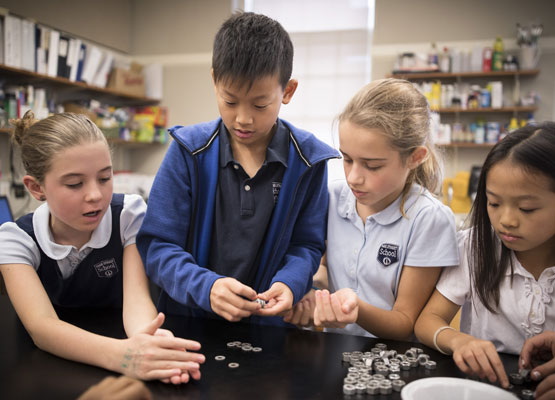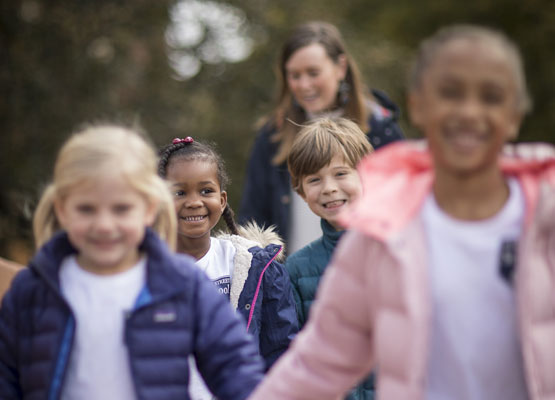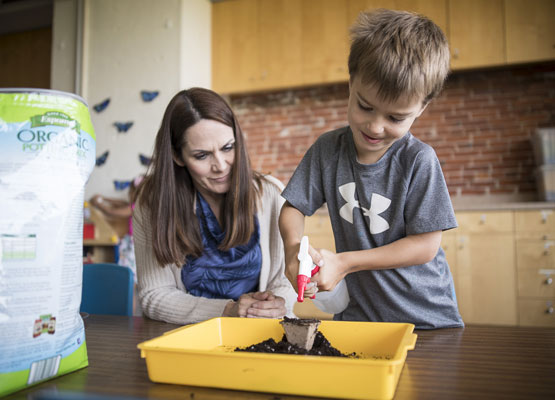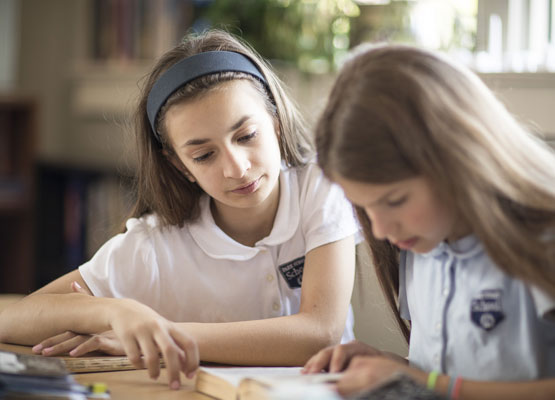
We believe in the transformative power of education
Within our caring community, students develop a lifelong love of learning, confidence, and strength of character.
Purpose and planning back each curriculum selection or enhancement we make. Our curriculum is continually perfected and honed with each lesson plan in order to provide the best practices and educational resources for our students.
Park Street School’s Core Knowledge philosophy and engaged learning is enhanced by our nurturing environment.

Building a Strong Foundation
Strong buildings start with firm foundations. Learning is no different. Our superior academics, grounded in Core Knowledge philosophy, impart the strong foundations of knowledge necessary to develop the critical thinking skills needed for lifelong learning. At Park Street School, knowledge is shared, built upon, and deepened in future grades. To learn more, read our article on Core Knowledge or visit the Core Knowledge website.
Across each division of Park Street School, curriculum is added to address specific areas of learning such as Typing Without Tears in third grade and Lively Letters and Open Court for phonics and literacy in Preschool.
The following elements add to the richness of Park Street School’s academic program. Each brings content to life and enables our students to learn in multiple ways:
"Out of the Chair" Learning
We believe active learning—sharing information through songs, games, STEM activities, creating iMovies, or in tableaus—helps everything connect more deeply. This is why we can often be found engaged in “out-of-the-chair” building and creating activities that foster collaboration and creativity.

Out of the Classroom
We regularly take learning out of the classroom. A quick ride on Boston’s “T” transports students to the world of Ancient Egypt at the Museum of Fine Arts to see firsthand the pharaoh’s mask they’ve been designing in class. A short walk to the post office at the State House introduces our Preschoolers to mail carriers, one of our Community Helpers groups.

Celebrating Student Variability
We believe there is no such thing as a “typical student,”so design lessons that provide multiple options for learning. This helps every student develop into an expert learner. (Universal Design for Learning)

Building Strong Communities of Learning
We know students learn best in a supportive environment. Using the Responsive Classroom approach, which focuses on the link between academic success and social-emotional learning, as well as additional resources, our students are explicitly taught and given frequent opportunities to practice using a set of social emotional tools. They include cooperation, assertiveness, responsibility, empathy, perseverance, and self-control.

Park Street School Stories
More Information
From their foundations of pre-literacy and phonics in the early grades, our students grow into lovers of literature. Amazing worlds and civilizations open up to them in each grade as they read exceptional children’s literature. It inspires their imaginations by bringing different time periods and cultures to life along with music, drama, art, and the Bible.
We are wired for technology! Students are introduced to age appropriate technology and instructed in its usage as they advance in age. Technology tools are used and taught more formally in Grades 3 through 6 with a 1 to 1 iPad correspondence. Students are exposed to Office365 instruction, keyboarding, digital ethics, and e-mail etiquette. By Grade 6, our students have been encouraged to extend their character education to develop good digital citizenship.
Students learn the scientific method—how to pose hypotheses, conduct experiments, and make conclusions based on findings. Every other year, our Science Fair pushes us further in our scientific exploration. Science inquiry starts with our youngest learners at the Preschool. Our LEGO Challenge in second grade combines a current science topic, the building of simple machines, coding, and engineering. Third graders study the engineering marvels of the ancient Romans, learning about tension and compression as well as how arches and domes work. Sixth graders learn to build bottle rockets while fifth graders create and race derby cars.
At age three, students begin to learn Spanish through song, movement, and games. They are introduced to vocabulary related to everyday objects, events, and environments as well as greetings and conversational skills. Each year our students’ Spanish skills are built upon and developed. By Grade 6 they have enjoyed nine years of Spanish language and cultural instruction.
Park Street School is designed to be a nurturing and safe environment for all students, a place where students develop positive self-image and self-control. As such, we expect all members of our school community to treat each other in a civil manner and with respect for differences, understanding that each person is a unique being, created by God. See our Anti-Bullying Prevention and Intervention Plan.
Students’ classroom learning is supported and enriched by specialists. They include a reading specialist, literacy instructor, math enrichment faculty, occupational therapist, speech therapist, and consultants.
Art, music, and drama are integrated into units and enjoyed as specific classes in order for students to make connections that bring history, literature, and science to life and build confidence. Children sing, learn the mechanics of music, become acquainted with styles of music, and are introduced to instruments in Music class. Our Fine Arts program has students creating art that exceeds their years. Students perform plays including “A Midsummer Night’s Dream” in fifth grade and the “Diary of Anne Frank” in sixth grade.
Using Everyday Mathematics, our students consistently demonstrate mastery in mathematics over and above other independent peer schools as well as suburban/public schools per the results of standardized testing. The strength of Everyday Mathematics lies in the hands-on, spiraling approach that teaches math in an intuitive and fun way.
We move, move, move! In Preschool we run, tumble, climb, throw, and strengthen daily. This helps with large motor development and sparks intellectual growth. In Elementary School the goals and objectives of athletics cover not only strength-building, skill, and physical development, but sportsmanship and cooperation. Learn more about Athletics at Park Street School.